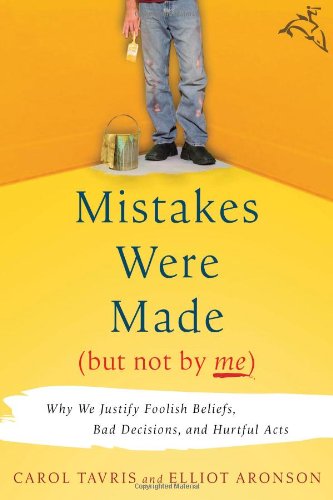Mistakes Were Made (But Not by Me) Summary

6 min read ⌚

MicroSummary: In “Mistakes Were Made (But Not By Me),” oft-cited and celebrated social psychologists Carol Tavris and Elliot Aronson deal with the nature and the problems of many self-justification mechanisms (such as cognitive dissonance, confirmation bias, and fabricated memory), while trying to show that the only way for a person to grow is by acknowledging his or her mistakes.
Why We Justify Foolish Beliefs, Bad Decisions, and Hurtful Acts
Nobody likes admitting mistakes. Unfortunately, that may lead to Donald Trump becoming a US president.
In the wonderfully titled “Mistakes Were Made (But Not by Me),” Carol Tavris and Elliot Aronson try to find out why is that.
And how you can prevent it.
Who Should Read “Mistakes Were Made (But Not by Me)”? And Why?
Whenever world-renowned experts publish something under a catchy-sounding title, don’t doubt for a second that it’s important to take note! “Mistakes Were Made (But Not by Me)” is one of these books. Its findings will certainly help police officers and judges, doctors and politicians. But, anyone who wants to be in a healthy relationship take this book seriously as well!
About Carol Tavris and Elliot Aronson
Carol Tavris is a renowned social psychologist and a celebrated feminist. She has authored numerous articles and books mainly dealing with the origin, the nature and the effects of pseudoscience. Additionaly, she is interested in gender politics, anger and cognitive dissonance.
is a renowned social psychologist and a celebrated feminist. She has authored numerous articles and books mainly dealing with the origin, the nature and the effects of pseudoscience. Additionaly, she is interested in gender politics, anger and cognitive dissonance.
 Elliot Aronson is one of the most cited psychologists of the 20th century. He has conducted many revolutionary social experiments, which have led to either the formulation or the confirmation of concepts such as cognitive dissonance and the Jigsaw Classroom.
Elliot Aronson is one of the most cited psychologists of the 20th century. He has conducted many revolutionary social experiments, which have led to either the formulation or the confirmation of concepts such as cognitive dissonance and the Jigsaw Classroom.
“Mistakes Were Made (But Not by Me) Summary”
Let’s say that you’re on a diet and that you’ve had a terrible week. You come home and you notice a Hershey bar lying on the table.
Do you:
a) put the bar in a drawer and put on some documentary and read a book; or
b) eat the chocolate bar and say: “The hell with it! It was a bad week and I deserve it!”
If you’ve answered a), you’re probably an alien. If you’ve answered b) – you just learned what cognitive dissonance is and how it messes you up.
Because, every self-justification begins with your brain experiencing cognitive dissonance. You watch your favorite team lose, even though you think they’re the best in the world? Now, how can that be – says your brain! The premises are contradictory.
In a logic-based scenario, the next move from here would be your brain telling you: “Well, then, I guess they’re not the best team out there!”
But, in reality, it tells you something quite different: “Hey, you, don’t despair! They are still the best team in the world! It was the referee that did it! No, wait a minute: it was both the referee and the other team which played dirty as hell!”
And even if you watch a thousand videos and hear thousand pundits which claim the opposite, you’ll reinterpret these claims to your favor.
Now, that’s another problem which arises from not accepting your mistakes! It’s called confirmation bias, and it’s almost unbeatable.
A good example is the US satanic cults scare in the 1980s. People called for investigations into the numerous reports of physical and sexual abuse which were spreading around like wildfire. Soon enough, the government couldn’t ignore the moral panic. The investigations resulted in – well, a really loud false alarm.
The accusers, however, didn’t back out. Instead, they were now even more convinced that there are powerful satanic cults all around. So powerful, in fact, that they’ve infiltrated the government which works to protect them.
Decades into the future and, even though there were no related news whatsoever in the meantime, these people still claim the same. But, now they have even fresher arguments: they were themselves abused by these cults.
And that’s the third part of our equation: fabricated memory.
You see, your memory is not unlimited, and after few years, your brain tends to keep only the most powerful or the most relevant images. So, even in the best-case scenario, you’re probably remembering your childhood wrongly. As vivid as it is.
And it gets even trickier:
If your childhood was traumatic, there’s a serious chance that your brain has invented your childhood and you don’t even know it. For example, in 1995, Binjamin Wilkomirski, published a memoir detailing his disturbing Holocaust childhood.
However, historians soon found out that there were serious holes in his story, and Wilkomirski was exposed as a fraud. It turned out that he indeed had a bad childhood and the Holocaust was the metaphor his brain invented in order for him to cope with it better.
And it’s even more interesting how this was discovered!
You see, a woman named Laura Grabowski claimed to have recognized Wilkomirski from the camps. (You can imagine Binjamin’s surprise, ha?) It soon turned out that this Laura was, in fact, Lauren Stratford. Which was the name she used to publish her memoirs about – you’ve guessed it – satanic ritual abuse!
And her real name: Laurel Rose Willson, a talented girl in need of attention, vocalist and pianist in evangelical Christian churches.
OK, maybe we’ve led you on a bit and you didn’t guess it!
But, see how the story neatly wraps up.
And we didn’t even see how some of these brain mechanisms work in daily practice. And the extent of the damage.
Fortunately, we have the “Key Lessons” section for that.
Key Lessons from “Mistakes Were Made (But Not by Me)”
1. Your Personal Life Will Suffer If You Don’t Admit Your Mistakes
2. Society Will Work Better If People Admitted When They’re Wrong
3. You Can Fight Cognitive Dissonance, Confirmation Bias, and False Memories! Here’s How!
Your Personal Life Will Suffer If You Don’t Admit Your Mistakes
The crux of the matter: if you don’t admit your mistakes – you’ll be a slave to your childish stereotypes. If you do admit them – you’ll grow. And everyone will benefit from it.
Just think of your partner! If you use him- or her-justification instead of self-justification, suddenly there will be much less arguments! And if both of you do that – you’ll probably experience something which, for most of the people, is an oxymoron: marital bliss!
Society Will Work Better If People Admitted When They’re Wrong
OK, let’s move this one notch.
What if you’re a member of the government, a doctor, or a police officer. Not admitting your mistakes may lead to a bad decision such as invading Iraq (ups!), the death of a patient, or a wrongly convicted criminal. Confirmation bias, and falsified memories should be your lifetime enemies in these cases.
Not your everyday friend.
You Can Fight Cognitive Dissonance, Confirmation Bias, and False Memories! Here’s How!
But, how can you oppose them? We ourselves said that they’re almost unbeatable!
Well, there are few simple strategies. First of all, crosschecking your memories against the memories of others. Then, use the power of wildly hypothesizing instead the power of intuition. Finally, read many historical and science books to find out how your views differ.
OK, maybe their summaries will do too!
Like this summary? We’d Like to invite you to download our free 12 min app, for more amazing summaries and audiobooks.
“Mistakes Were Made (But Not by Me)” Quotes
History is written by the victors, but it's victims who write the memoirs. Share on X It's the people who almost decide to live in glass houses who throw the first stones. Share on X In the horrifying calculus of self-deception, the greater the pain we inflict on others, the greater the need to justify it to maintain our feelings of decency and self-worth. Share on X The trouble is that once people develop an implicit theory, the confirmation bias kicks in and they stop seeing evidence that doesn’t fit it. Share on X Science is a form of arrogance control. Share on XOur Critical Review
Even when “Mistakes Were Made (But Not by Me)” uses isolated sociological studies and anecdotal evidence in the vein of Malcolm Gladwell, it’s written by two people who have written much more difficult books quoted by many scientific papers.
Both Carol Tavris and Elliot Aronson are names in their profession and of course we believe them – even when they sound more like popular scientists than eminent psychologists. Their message is quite simple: admit your mistakes and you’ll be more beloved and live a happier life.
By the way, did you know that John F. Kennedy was the last US president to ever apologize? Do you really think that the others made no mistakes? Of course, they did. They just didn’t outgrow them.








